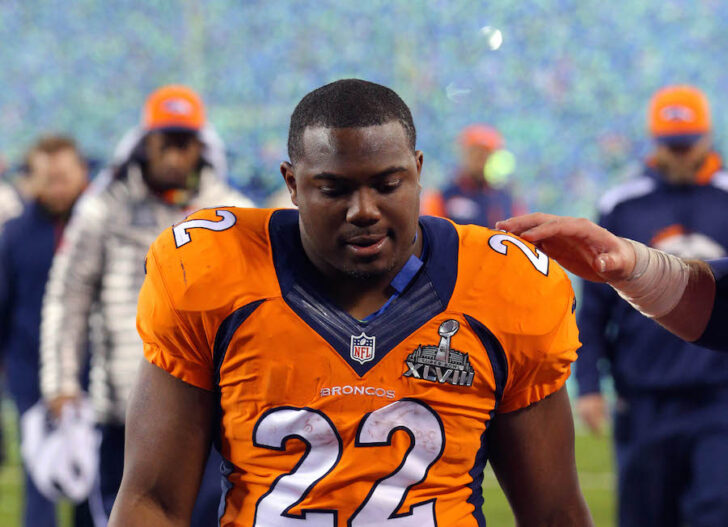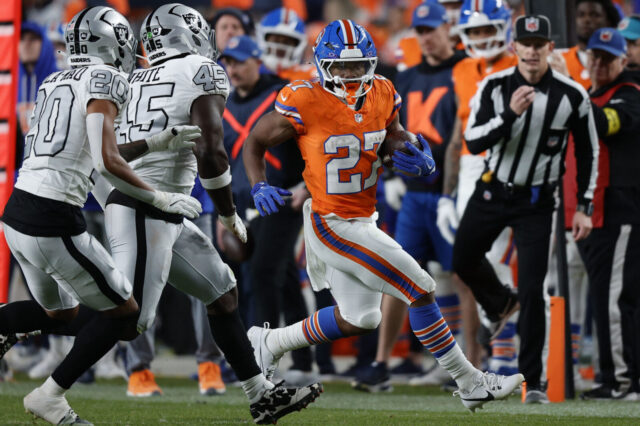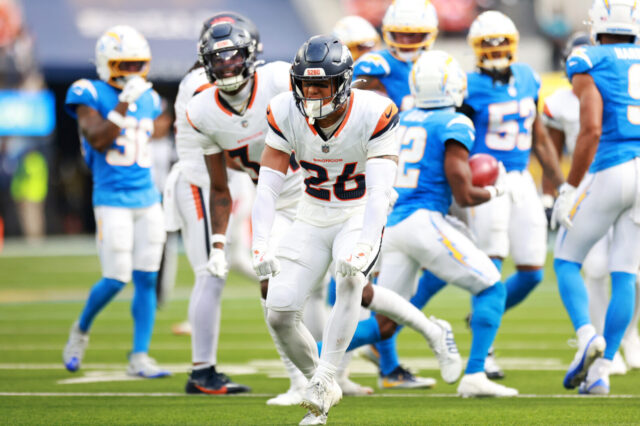Nobody could beat the Denver Broncos.
Not the 2013 Broncos. Super Bowl XLVIII was a mere formality. I can vividly remember walking around the concourse of MetLife Stadium in East Rutherford, N.J. four or five hours before kickoff and watching all the pregame commentary shows. There were television screens everywhere – massive high-definition monitors at every corner of the field, flatscreens at every concession line, suites and boxes with multiple viewing options. But not one screen featured a panel of experts who were picking the Seahawks.
There might have been the occasional dissenter, but that was just for better TV. A discussion can’t be had when everyone on the show picks the same team. Even then, this was a lopsided affair – everyone had the Broncos whipping up on the Seahawks.
Why? Well, to begin, nothing was going to derail the freight train that was the Denver Broncos offense. Everyone in America had seen it play out all season long; the Broncos were the darlings of highlight shows from morning until night. Denver’s offense had put up 606 points, the most of any team in the history of the league. They tossed the ball around as if the defense wasn’t there; they posted more passing yards than anyone ever had. Peyton Manning was operating a finely tuned machine.
No matter how good Seattle’s defense was that year, no matter how much Richard Sherman popped off, no matter how smug Pete Carroll appeared, none of it would be enough to slow down Denver. The NFL had become a passing league and nobody did it better than the Manning-led Denver Broncos.
And then the game happened. No one – even those who suggested that Seattle had a puncher’s chance of winning – saw this coming. If anyone had suggested a score of 43-8, they’d have done so envisioning Denver hoisting a third Lombardi Trophy. Literally, everyone saw what happened, but figuratively, nobody knew what had just happened.
Especially the Broncos.
Fast forward two years and let’s hope whatever happened – however it happened – has soaked in. And, in fairness, it probably has. The process of “fixing” what happened in Super Bowl XLVIII began the moment John Elway, with yet another Super Bowl loss in tow, boarded the bus in snowy Manhattan en route back to Denver. He wanted to start fixing the on-field product immediately, knowing that finesse – no matter how much his Broncos possessed – still didn’t win championships. He’d witnessed a physical and tough defense squeeze the life of his high-powered offense. He saw his own defense get beat badly by an offense that was mediocre by comparison, all because they weren’t tough and they weren’t aggressive.
A look at the Broncos now reveals that those problems have been addressed. Denver rides its brash, chippy, physical defense into San Francisco. Wade Phillips, the man who conducts this defensive orchestra, takes risks and employs a variety of looks; two things that Jack Del Rio, the Broncos defensive coordinator in Super Bowl XLVIII, rarely (if ever) did.
Even on offense, Elway insisted that in order to win, a team must at least attempt to run the ball. Denver doesn’t necessarily run well now, but it’s not for a lack of trying. Whether the yards pile up on the ground or not is – at least in some ways – irrelevant. What matters is that running the ball wears down an opponent over the course of four quarters, and it keeps everyone honest, too.
But those are on-field fixes. What can be learned from Super Bowl XLVIII off the field – before the game, the stuff between now and then?
Something tells me the Broncos learned a lot about that, too. If I had to guess, they learned more than they’d like to admit. What happened in New York was an embarrassment, but what happened in the days that led up to the game was – in many ways – even worse. Former Denver Post writer Mike Klis wrote in March of 2014: “Whatever the Broncos did to prepare for their Super Bowl XLVIII game against the Seattle Seahawks, they should never repeat it.”
Don’t think for a second the Elway didn’t read those words of warning.
In the days that followed one of the most embarrassing Super Bowl losses in NFL history, bits of disturbing information began to surface – some of them even before – that the Broncos were perhaps a little too busy enjoying the Big Apple. Manhattan is full of temptation, and the rumblings suggested that some Broncos players might have found it. John Fox decided to move his team’s residency on the eve of the Super Bowl, an unprecedented decision that looks odd – at best – in retrospect. Why would he do such a thing? Fox cited “family distractions” but 24 months later that sounds a little fishy.
Aside from the alleged tomfoolery, the Broncos did nothing like they’d done it all year. They didn’t follow any sort of routine. Partially, that was the NFL’s fault, as the league somewhat randomly selects how and when media sessions are to be handled. The Broncos practiced early in the morning – something they hadn’t done all year – so they could accommodate the media schedule in the afternoons. They bounced practice from outdoors to indoors, and indoors to outdoors. They conducted media sessions on a boat that sat on water; some complained that motion sickness had affected the team on occasion.
During the season, back at Dove Valley before road games, Fox would play music over the load speakers so the Broncos could prepare for crowd noise. Before the Super Bowl, he incorrectly assumed a neutral stadium would be relatively quiet.
Aside from reading up on Sherman and his big mouth (the NFC Championship game concluded with a famous Sherman interview outburst), it looked as if the Broncos didn’t know their opponent at all. Seemingly everything the Seahawks did caught Fox and his staff off guard. If ever there was a game plan, it was aborted almost immediately.
Aqib Talib told reporters just yesterday that Cam Newton was the “most dangerous quarterback in the NFL.” Hey, that’s a start. It’s a far cry from a defense that might have dismissed Russell Wilson as too young and inexperienced to win a Super Bowl, and laughed when Seattle’s receiving corps suggested they were every bit as dangerous as Denver’s trio of Demaryius Thomas, Eric Decker and Wes Welker.
Following the win in the AFC Championship game, the Broncos official Twitter account posted a photo of Kubiak addressing his team. The caption was short and sweet, a quote presumably from Kubiak’s postgame speech: “The game is in two weeks. But the game is won [this] week.”
Contrast Kubiak’s words of wisdom to an answer provided by John Fox, words that have become hauntingly famous. When asked what Fox would have done differently in preparation for Super Bowl XLVIII, he answered only as ol’ Foxy could: “Probably everything.”
That sounds about right.



